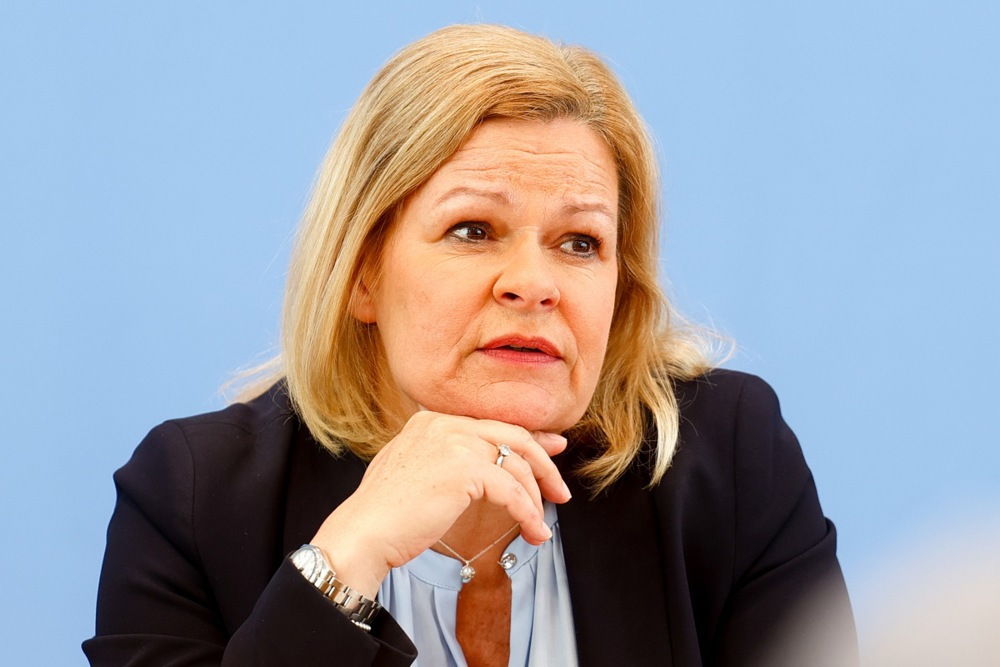German interior minister Nancy Faeser has told the European Commission in a letter that her country cannot handle the migration situation any more and drastic reforms on a European scale are needed.
After announcing a new border-control crackdown, Faeser — a member of Chancellor Olaf Scholz’s Social Democratic Party (SPD) — sounded the alarm on immigration to Germany.
She proposed a change in the Dublin Regulation, the European rules that determine which European Union Member State is responsible for examining an asylum-seeker’s application.
“No country in the world can take in refugees indefinitely,” she told Brussels in a letter seen by the weekly Der Spiegel. It was an “unchanged worrying situation”, she said.
Faeser added that the pressure from migration was expected to “remain unabatedly high”, with 50,000 migrants reaching Germany in July alone.
Next to the Federal and State governments, local municipalities are not faring much better, she pointed out.
The migration authorities were “increasingly reaching the limits of what is affordable in terms of reception, accommodation and care,” the minister said.
That risked “overtaxing the solidarity of the community”, she warned.
Faeser went on to point out “dangers to public safety and order”, something that reached the top of the political agenda after the murderous knife attack in Solingen in August by an alleged jihadist, believed to be a 26-year-old illegal migrant from Syria, who had sought asylum in 2022.
The German government on Thursday announced a proposed package of tighter security and asylum measures following a deadly stabbing spree linked to Islamic State. https://t.co/sZLG4pDT0u
— Brussels Signal (@brusselssignal) August 30, 2024
Many neighbouring countries protested against the announcement of border controls in Germany and, with her letter, the German interior minister appeared to want to justify her actions.
“Incidents of knife and violent crime by refugees have led to a massive impairment of the population’s sense of security and internal peace,” she said.
Faeser told Brussels she was concerned about “the increasing disfunctionality of the Dublin system”. Those rules stipulate that the first EU country an asylum seeker enters is responsible for processing their claim.
The minister appealed to the European Union “to continue to work together energetically and vigorously to achieve visible and rapid progress here”.
On September 10, the ruling German traffic-light coalition proposed legislation to make it possible to send back refugees more quickly when other Member States were responsible for their asylum procedures – for example, Greece, Italy, Bulgaria and Romania.
Berlin has still been shying away from refusing entry at the borders, citing legal concerns.
Polish Prime Minister Donald Tusk has called the unilateral decision by Germany to reintroduce border controls “unacceptable”, adding that it was the country's failed migration policies that caused the migrant crisis in the first place. https://t.co/RdK6eSlKXQ
— Brussels Signal (@brusselssignal) September 11, 2024
During talks with the Christian-Democrat (CDU) on the topic, the latter proposed to use an emergency clause in the Treaty on the Functioning of the European Union to allow rejections at the border but the progressive majority rejected this plan.
On September 12, the German Government presented the aforementioned — and hotly debated — legislative package to tackle asylum and security, which was created after the Solingen attack, in the country’s parliament.
The government package called for more restrictions on knife possession, reductions in welfare benefits for specific categories of asylum seekers and enhanced authority for law enforcement agencies in counterterrorism efforts.
That fulfilled “the fundamental promise of a democratic state to ensure freedom and security for citizens”, Faeser said about the proposal in the Bundestag.
“We must not and we will not allow this promise to be called into question by violent extremists,” she continued.
She added that there could be no “one hundred per cent security in a free, open State”.
Thorsten Frei, the parliamentary manager of the CDU parliamentary group in the Bundestag, said the package contained “many reasonable measures” even if they lacked comprehensive rejections at the German borders.
His party proposed an alternative draft law, going further and introducing comprehensive rejections at the German borders.
For decades, Germany’s political establishment avoided open debates on mass immigration. This was changed by the recent State elections in Thuringia and Saxony.
Those saw a surge in support Alternative for Germany (AfD) and the newly-formed Sahra Wagenknecht Alliance (BSW), which are highly critical regarding open-border migration policies.
In the first six months of this year, almost 25 per cent more companies in Germany filed for insolvency compared to 2023, with experts fearing that the worst is yet to come. https://t.co/uIc48ob7vs
— Brussels Signal (@brusselssignal) September 11, 2024





